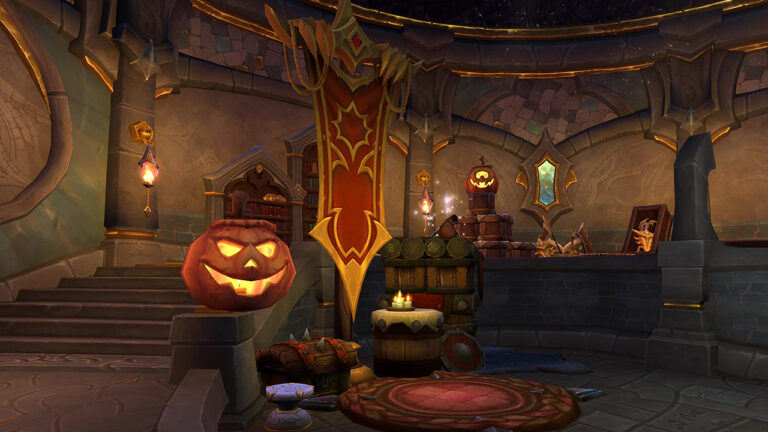The fall chill was in the air, in 2007. It was another Hallow’s End and the decorations, quests and festivities in World of Warcraft were the exact spirit of Halloween. The world felt like a fantasy novel had come alive and the holiday had this sense of true meaning. Now it’s as if a holiday is more side quests, you don’t really want to mess with unless the game offers some kind of inresistable reward for the effort.
Players complain frequently about the lack of connection with holiday events or, even worse, they get almost little press and fanfare being more or less automatic gestures of the change of time. Why in two decades has gaming changed so much from the cozy, comfy connected holiday experience to what tad amounts to almost ignorable window dressing in online games?
While I think it wouldn’t be fair to answer that with a generalization, since many still find joy in the holiday theming in games. However, there are quite a few reasons why many feel that way, as players often express on social media, which we can delve into.
Content Speed Impacts Immersion
Online games were very slow before the single player overhaul that occurred in the genre starting in 2014. Group content required a considerable amount of waiting and waiting was in essence the time for immersion. That was the time in which the player would need to pause for a moment and look at their surroundings. To take in the world in which they virtually sit.
In 2007, the vast majority of content in World of Warcraft required a group or considerable effort on the player’s part to go on a solo incursion into the world. This resulted in a lot of downtime, a lot of time spent in the main cities and that time spent there was meaningful since travel back then was slow, costly and required a lot of waiting. Returning to a capital city was a chore!
Alt-tabbing out of the game was also a percarious task, one that would cause even top end PCs to chug slightly. Alt-tabbing out didn’t provide the escape it does today, there was no YouTube and bandwidth was restricted almost for everyone so streaming much of anything was out of the question.
Players at the time were stuck within a game in which they couldn’t leave with not much to do, making the holiday events seem a lot more enticing.
Overwhelming Amounts of Content Dilute the Experience
In ~2007 the only things to really do in WoW were dungeons, raids and daily quests / farming after you hit max level. Dungeons and raids required groups, which require waiting. Daily quests and farming were chores you could do, but still had a lot of down time if you were to even engage in them.
Now there’s a plethora of content across multiple expansions for you to consume daily, along with the mandatory daily content that you’re heavily incentived to do. Dungeon finder queues are quick along with the dungeons.
Other games like Star Wars: The Old Republic transitioned their entire model to a single player model. Their already fast-paced combat styled was introduced to a shorter main quest and quicker access to endgame content which the game heavily focuses on. Not requiring other players to do content means that players have something to do at all times and automatic queues for things that require others.
All of this content means that the quirky holiday events are less relevant and less meaningful. When you have so much choice, why choose something that might not be nearly as fun as just queuing into a dungeon?
Seasoned Adventurers Have Been There, Done That
The online video game industry has evolved over the last few decades and players tastes have evolved with it. In addition, players have consumed a massive amount of content already. Not from any one specific game, but generalized across multiple games. If you’ve done a hoilday event say for an entire decade, at what point does that holiday event mean something to you?
Does that meaning come back if you switch games, but the general vibe and content is the same?
Players who have played video games for a long time can become fatigued by a tired trope, choosing to loose interest in the overall vibes.
New Adventurers Have Different Issues
Players who are just starting to get into online gaming, usually of the younger demographic, don’t feel the same kind of fatigue that gamers who have been gaming for quite some time feel. They, however, can feel disconnected from what appear as tired tropes or rehashed content very quickly. A digital savvy generation isn’t bought into the immersion and illusion these virtual worlds once held; their attention span is focused on goal oriented tasks that lead to power advancement.
The modern gamer also prefers smaller chunks of content, across all media including video games and TV. Below, a quick quote from Gloria Mark, PhD, highlights how we’ve gone from 20-30 second commercials down to less than six second commercials, due to the value of the shortended consumer’s attention span.
So we’ve become accustomed to seeing very fast shot lengths when we look at TV and film. Even commercials have shortened in length. Commercials used to be much longer. Now it’s not uncommon to see six-second commercials, even shorter than that.
Why our attention spans are shrinking, with Gloria Mark, PhD (apa.org)
This results in the holiday content only being meaningful, again, if the reward is valuable. Otherwise, it’s more tired tropes and dressing.
Restoring the Vibe of the Holidays
I’m not one to try and recapture moments from the past and demand they be rehashed in the future. The path forward isn’t to try and recreate what was, but to embrace the now and present. Holiday events should provide meaningful, valuable loot but also embrace the tropes they’re based on. Retooling may be neccessary to fit the modern audiences tastes and that’s okay! I think it’s even neccessary.
For all the mobile games out there that place their characters in a silly hat for each holiday, I do want to add that they don’t help ruin the spirit a smidge. I don’t think every game needs to be on theme with a holiday, especially when it’s so often used to progress the sale of a seasonal item pack. I get the marketing opprutinity, however, player fatigue can result in tired sales.
The modern gamer has more refined tastes as well. No longer are they lured to purchase items because they’re available. Wearing bunny ears all year long isn’t on most people’s fashion radar, making the seasonal items harder to sell. That development time can loop into virtual items players actually want without being tied to tired seasonal tropes.
Conclusion
Ultimately, the constant repeat of the seasonal events along with the deluge of available content and other diversions make seasonal events less of an event and more of a regular occurance. Game companies who attempt to be more original can find more success in reigniting player’s passion around seasonal content, but unique approaches need to be made to garner player support. Take a look at Dave the Diver, a quirky game that does everything differently but with the same tropes; massive success in a small beautiful package.
Ultimately, I ask the question to you, how do you feel about seasonal content in video games and do you think its more or less immersive?







